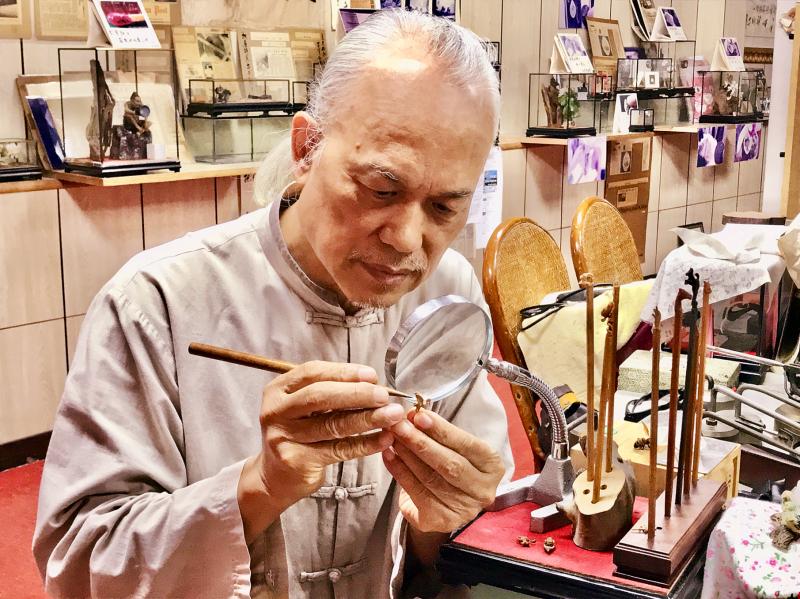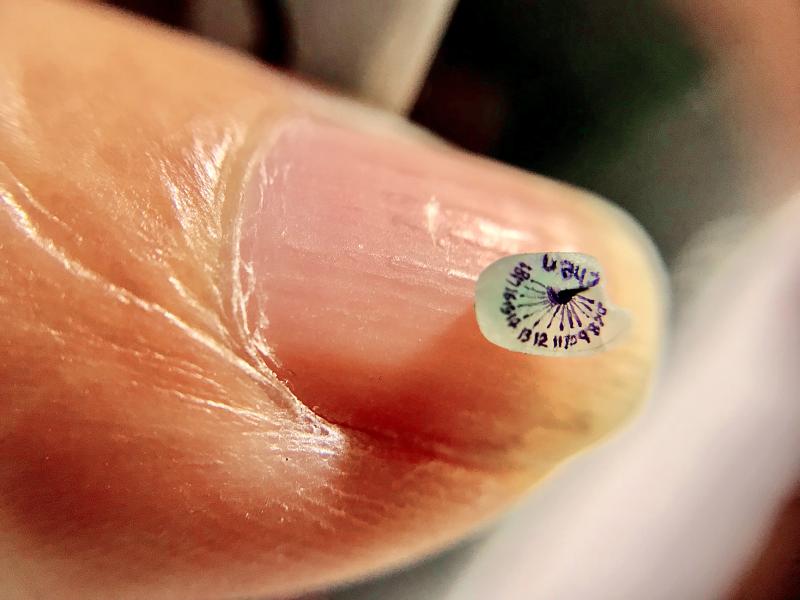Taiwanese miniature craftsman Chen Forng-shean (陳逢顯) has broken the Guinness World Record by making the world’s tiniest sundial from a grain of rice grown in Taiwan.
The French astronomical society had asked the French Office in Taipei to contact Chen and invite him to make a record-breaking sundial, which he completed after failing dozens of times.
The society provided Chen with information and photographs of the smallest sundial in the world — measuring 0.65cm by 0.5cm — that was created by an Italian in 1999.

Photo: Weng Yu-huang, Taipei Times
After a careful assessment, Chen told the society that he had no problem making a smaller sundial.
He used a grain of a type of Taiwanese rice to make the sundial, which, at 0.5cm by 0.3cm, set a new record.
A sundial is a device that uses the position of the sun to tell the time of day. The basic structure consists of a flat surface and a gnomon, which casts a shadow onto the dial.

Photo courtesy of Chen Forng-shean’s workshop
The shadow moves on the surface as the position of the sun changes and its tip aligns with different lines drawn on the surface to indicate the time.
A gnomon can be made from a wooden bar, a metal wire or a decorative sculpture, Chen said.
Chen said that the secret of making a sundial out of a rice grain lies in securing the position of the grain during the process.
He used tools such as a steel needle and writing brush to write tiny Arabic numbers from 6 to 18, covering the period between sunrise and sunset.
Chen said that with the help of a magnifying glass, he wrote the numbers and drew lines on the sundial while holding his breath.
The spacing of each number had to be carefully arranged since the rice grain was so small, he added.
Chen said he found the work meaningful because it was an act of people-to-people diplomacy.

The manufacture of the remaining 28 M1A2T Abrams tanks Taiwan purchased from the US has recently been completed, and they are expected to be delivered within the next one to two months, a source said yesterday. The Ministry of National Defense is arranging cargo ships to transport the tanks to Taiwan as soon as possible, said the source, who is familiar with the matter. The estimated arrival time ranges from late this month to early next month, the source said. The 28 Abrams tanks make up the third and final batch of a total of 108 tanks, valued at about NT$40.5 billion

Two Taiwanese prosecutors were questioned by Chinese security personnel at their hotel during a trip to China’s Henan Province this month, the Mainland Affairs Council (MAC) said yesterday. The officers had personal information on the prosecutors, including “when they were assigned to their posts, their work locations and job titles,” MAC Deputy Minister and spokesman Liang Wen-chieh (梁文傑) said. On top of asking about their agencies and positions, the officers also questioned the prosecutors about the Cross-Strait Joint Crime-Fighting and Judicial Mutual Assistance Agreement, a pact that serves as the framework for Taiwan-China cooperation on combating crime and providing judicial assistance, Liang

A group from the Taiwanese Designers in Australia association yesterday represented Taiwan at the Midsumma Pride March in Melbourne. The march, held in the St. Kilda suburb, is the city’s largest LGBTQIA+ parade and the flagship event of the annual Midsumma Festival. It attracted more than 45,000 spectators who supported the 400 groups and 10,000 marchers that participated this year, the association said. Taiwanese Designers said they organized a team to march for Taiwan this year, joining politicians, government agencies, professionals and community organizations in showing support for LGBTQIA+ people and diverse communities. As the first country in Asia to legalize same-sex

MOTIVES QUESTIONED The PLA considers Xi’s policies toward Taiwan to be driven by personal considerations rather than military assessment, the Epoch Times reports Chinese President Xi Jinping’s (習近平) latest purge of the Chinese People’s Liberation Army (PLA) leadership might have been prompted by the military’s opposition to plans of invading Taiwan, the Epoch Times said. The Chinese military opposes waging war against Taiwan by a large consensus, putting it at odds with Xi’s vision, the Falun Gong-affiliated daily said in a report on Thursday, citing anonymous sources with insight into the PLA’s inner workings. The opposition is not the opinion of a few generals, but a widely shared view among the PLA cadre, the Epoch Times cited them as saying. “Chinese forces know full well that